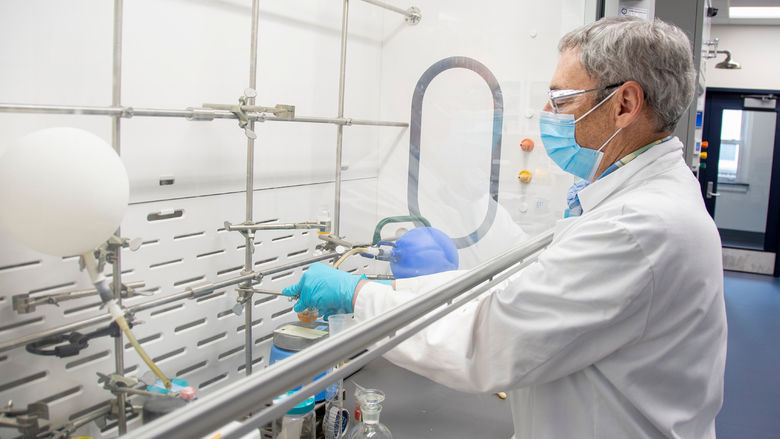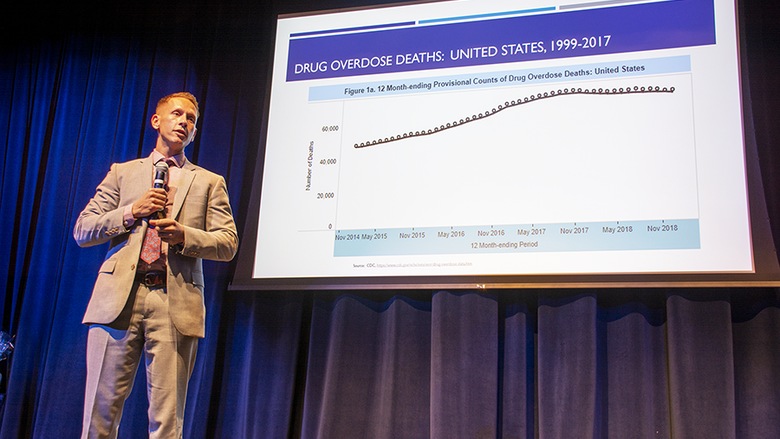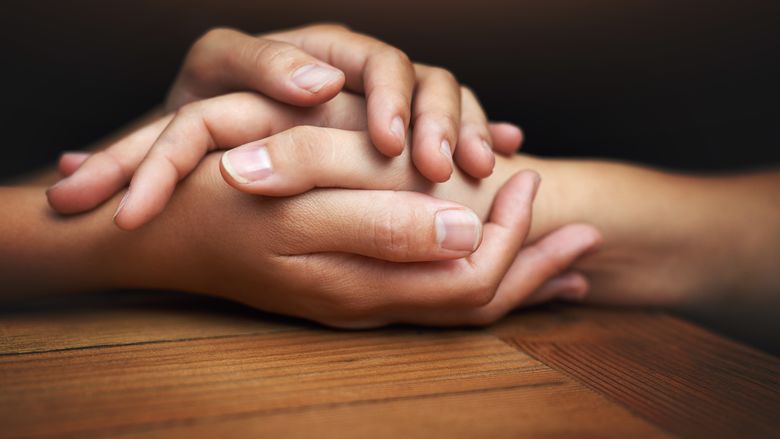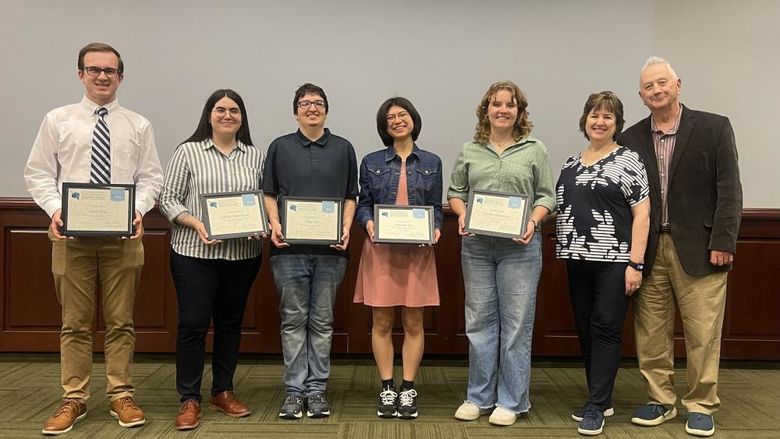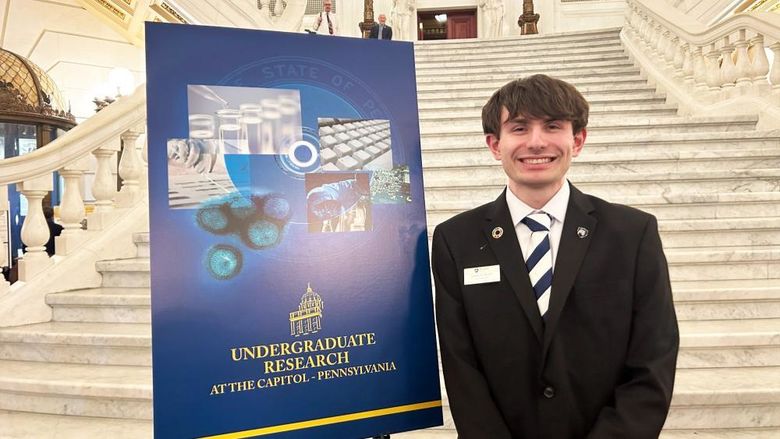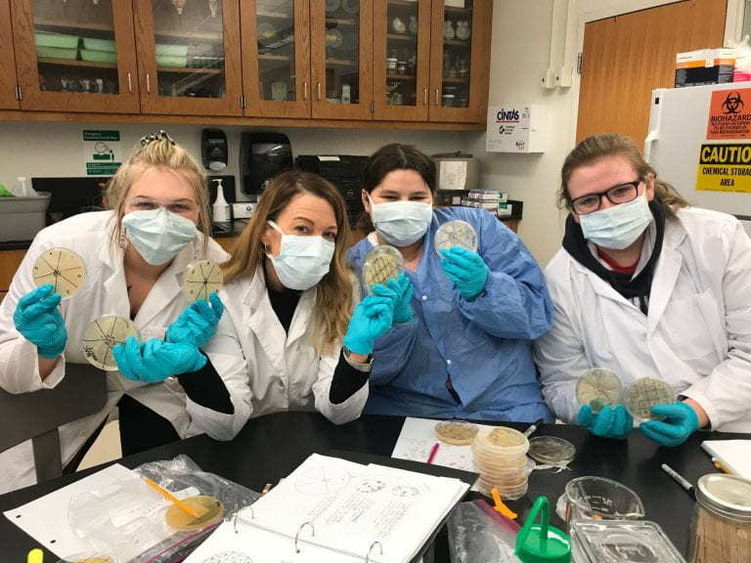
In February 2020, a group of Penn State Schuylkill's Microbiology 107 students took soil samples from the campus grounds. After securing their samples that day, they returned to the lab where they diluted their soil and smeared it on petri dishes to search for naturally occurring antibiotics. From left to right: Marleigh Cressley-Lipinski, Melissa Crenko, Courtney Foster, and Rachel Strohl.
SCHUYLKILL HAVEN, Pa. — On a cold winter day early in the 2020 spring semester, more than 30 Penn State Schuylkill students emerged from their biology lab clad in bright orange safety attire and began digging up soil beneath some of the campus’s trees. They were collecting soil samples to test for naturally occurring antibiotics as part of their Microbiology 107 lab course taught by Lecturer of Biology Mary Ann Smith.
When the students returned to the lab, they smeared their soil samples on petri dishes filled with agar, a jelly-like substance created from algae that fosters bacterial growth. Then, they put their samples in an incubator … and waited.
The students' local research efforts are part of two larger, national and international projects that Smith brought to campus: the Small World Initiative and Tiny Earth Program, both of which aim to crowdsource antibiotic discovery from soil. Both organizations intend to inspire students to pursue careers in science while also helping to develop effective antibiotics, which are in diminishing supply as superbugs continue to threaten world health.
This is important work. The Centers for Disease Control and Prevention (CDC) report that more than 2.8 million people in the United States each year contract an antibiotic-resistant infection, and more than 35,000 die because of the infection. The Penn State Schuylkill students hope their research might play some part in improving those numbers.
Changing course due to COVID-19 implications
Mid-semester, the students’ antibiotic discovery was derailed by COVID-19 when Penn State transitioned to remote learning. But Smith was determined to complete the research, even if it had to be done in a different manner than initially planned. So, she moved all of the samples from Penn State Schuylkill’s labs to a facility nearer her home.
From this intimate setting, Smith set her phone on a pedestal and created a workspace by a computer, and then she held Zoom conversations with the students regarding their samples and helped them record the data. Together, they engaged in biochemical analyses to determine what the bacteria may be and the enzymes it possessed.
Smith and her students tested the bacteria against known pathogens, including Staph. epidermis and E. coli. These pathogens are not only the safest to test, but also most closely related to human health.
“We spent the semester characterizing the students’ bacteria, especially trying to find the other bacterial families that they can produce antibiotics against,” said Smith. “These are big concepts that can seem like a real mess on paper, but are more easily understandable through hands-on research.”
Smith guided 35 students — most of them studying nursing — through antibiotic discovery research this spring.
“I think this project is especially useful for them because they can talk to their patients about the scientific concepts and really help break it down for families in crisis,” Smith said.
Connecting lab experience to the real world
At the end of the semester, the students presented their research at the first-ever Penn State Schuylkill Small Worlds / Tiny Earth Research Symposium, which was held remotely via Zoom. In their presentations, the students reviewed their testing processes and reported their findings. As Smith predicted, the students demonstrated that their studies helped them better understand medicine in a real-life context.
Tyler Burns, a nursing student who participated in the research, immediately connected his learnings with his everyday life. “I live with someone who has a compromised immune system, so this semester of microbiology has not only been interesting, but incredibly informative,” said Burns. “I’m excited to be a part of this program that will hopefully gain some ground in the fight against antibiotic resistance.”
Rebecca Kellagher, also a nursing major, added, “This research benefits me in so many ways because it’s preparing me for handling the bacteria and viruses that I will come into contact with in my work as a nurse.”
Despite the semester’s peculiar circumstances, the students overcame obstacles and became pioneers in antibiotic discovery at Penn State Schuylkill.
To learn more about the program and view the students’ presentations, visit the Small Worlds / Tiny Earth Program website, with expert content curated by the students themselves.
